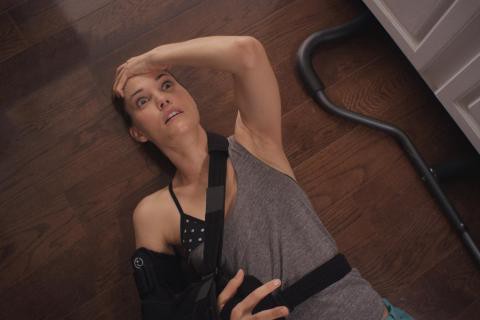You may not have heard of Liz Tuccillo, but you’ve definitely heard of her work. Tuccillo’s first credited script was “The Post-It Always Sticks Twice” episode of Sex and the City, a one-time gig she parlayed into co-authoring the Carrie Bradshaw-inspired He’s Just Not That Into You. Tuccillo followed up on the blockbuster sales of that self-help book with her first novel, How to Be Single. In her directorial debut, the writer-turned-filmmaker explores yet another facet of dating in Take Care (opening Dec. 5), which focuses on the post-breakup relationship a woman has with her ex.
When a car crash leaves Frannie (Leslie Bibb) immobilized, she is brushed off by everyone she can count on. With nowhere else to turn, Frannie reluctantly calls her ex, Devon (Thomas Sadoski), for help. It isn’t before long that old wounds emerge — and are made worse when Devon’s crazy new girlfriend (Betty Gilpin) also shows up.
Women and Hollywood spoke with Tuccillo about the differences between writing for books vs. movies vs. TV, exploring the inevitable awkwardness of dealing with exes, and the unexpected challenges of shooting primarily in a single apartment.
Women
and Hollywood: You’ve written books and movies and TV. What is appealing about
each format, and which do you like the best?
Liz
Tuccillo: Books are really fun because your “voice”
is pretty undiluted. There is a very direct connection between yourself and
your audience. You will have an editor, but their job is to help you
clarify or improve your voice, not change it.
Television
is fantastic because you get to follow a group of characters over time, and
their stories can enrich and surprise you. And you get to work with a group of
people over time as well, which can be very satisfying with the right group.
Film
is the toughest one for me, as there are many fingers in the pot, so it can be
disappointing. However, to have your work seen on such a large scale, that’s a
very exciting prospect. As for indie films, you have fewer people chiming in,
so it can be very satisfying to see your work on screen. Grueling, but
satisfying!
W&H:
How did you come up with the idea for this film?
LT:
A friend of mine, Nadia Dajani, who actually is in the film in the role of
Frannie’s sister, Fallon, was recovering from rotator cuff surgery. A bunch of
friends were coming over to take care of her, and the idea started percolating
in my head. Also, I often pondered the notion of exes, and what a strange
breed they are. People that knew you so intimately at some point in your life are now maybe strangers — what do they mean to you as you
move on in life?
W&H: The
film pretty much takes place in Leslie Bibb’s apartment while she is
recovering. What were the challenges in making this set work throughout the
film?
LT: That
it was August. That after about the fifth day of shooting, the apartment that I
once thought was so spacious seemed like a shoebox. That we were all getting
sick with a cold. That the neighbors were getting mad. That there was an insane
amount of planes flying overhead that we had to hold for, all the
time.
W&H: This
is your first feature. How did you get financing?
LT:
Like with so many indies, it’s just grabbing money from as many different
private sources as possible — yourself, friends, family — and trying to keep
costs as low as possible.
WaH:
You wrote one of the seminal episodes of Sex and the City about the break-up
post-it. Did you have any idea when you were writing it that it would become
such an important episode in the series?
LT:
Ha! To me, I always think people are referring to the episode before mine, when
Carrie finds the post-it at the end of the episode: “Hop, Skip, and a Week,” written by Amy B. Harris. Mine is the one after where she reacts to it by going
out for a night on the town with the ladies. But no, you never know how things
are going to land when you’re writing or talking about them in the room. It
felt like a great story area, the crappy ways people break up with each other. But
you never know. I think the show became so important that there were so many
episodes that became iconic. I still can’t believe I got to work on that show.
W&H: Women
directors find that the easiest road for them to direct is also to write. Is
that your experience?
LT:
It helps. You don’t have to wait around for someone to give you a job.
W&H: You
are next working with Lauren Graham on a sitcom for NBC’s Kate on Later. Can you
give us a bit of info about it? What excites you most about that?
LT:
Lauren Graham! I’ve loved her forever. This was her idea, and I am incredibly
thrilled to get to be a part of it.
W&H: Do
you have any advice for other female directors?







